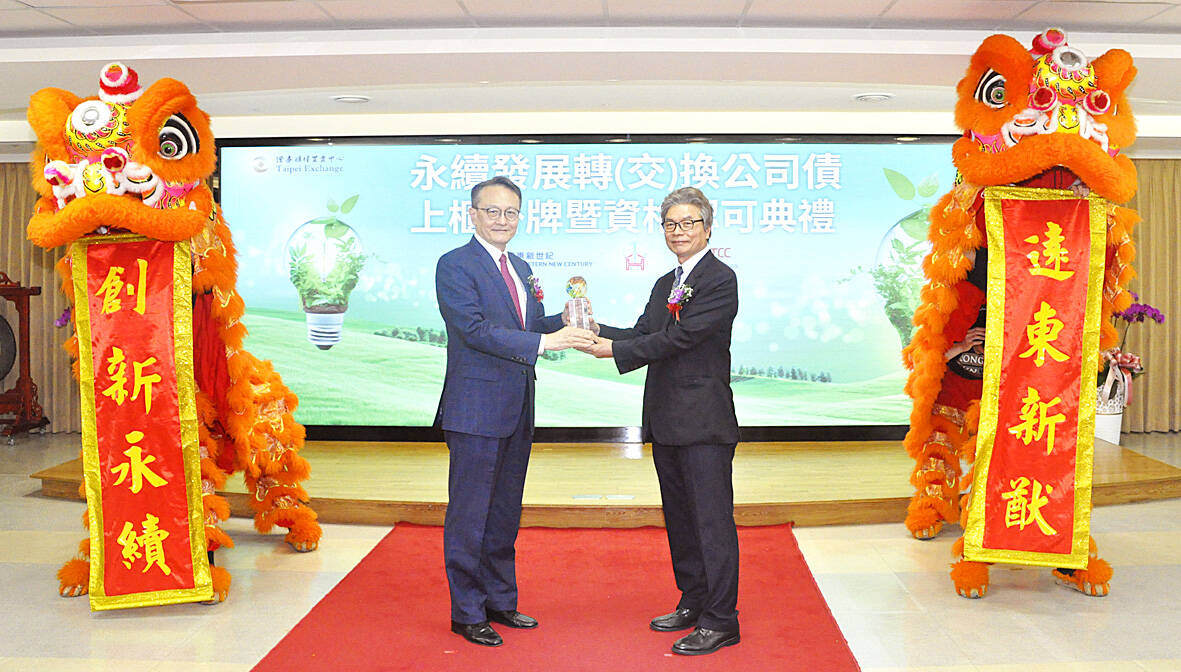In response to the government’s sustainable development policy, Far Eastern New Century Corp (FENC, 遠東新世紀) was the first company to be qualified to issue a sustainable development exchangeable bond.
The exchange bond was listed and began trading on the Taipei Exchange yesterday. As the lead underwriter, KGI Securities Ltd (凱基證券) facilitated the issuance, driving Taiwan’s sustainable bond market toward a new milestone.
The issuance involved exchangeable bonds for NT$1 billion of Asia Cement Corp (亞洲水泥) and NT$1.5 billion of Far Eastern Department Stores Co (遠東百貨) with a term of five years.

Photo courtesy of Far Eastern New Century Corp
“To cope with an era of carbon pricing, corporate entities must address the impacts of climate change and provide responsive solutions toward decarbonization, transforming the challenge into a strength in order to take the lead in the race to net zero,” FENC chairman Douglas Hsu said.
FENC, an innovative industry pioneer, responded to the government’s sustainable development policies and integrated financial planning seamlessly into its corporate sustainability strategies.
FENC was the first to offer several sustainable financial products in Taiwan with great success, channeling investment funds into sustainable projects from diverse sources, and fostered a positive cycle among government and corporate entities, and investors.
Taipei Exchange released the guidelines for sustainable development bonds in December last year, allowing convertible bonds to be issued within the scope of sustainable development bonds, with an aim to expand the market for sustainable development bonds.
FENC took the initiative once again and successfully issued the first corporate sustainable development exchangeable bond, to set an example and encourage more corporate entities to participate in sustainable development.
The funds raised by the FENC listing are to be used to support investment projects with green benefits for the company and its subsidiary, Oriental Petrochemical (Taiwan) Co Ltd (亞東石化股份有限公司). With measures to improve manufacturing processes, equipment and energy management, the company aims to actively achieve sustainability transformation goals — reduce greenhouse gas emissions by 50 percent, grow green products to 50 percent and utilize 50 percent green feedstock by 2030.
This would contribute to the overall long-term operational development of the company, as it strives to practice environmentally friendly and socially prosperous sustainable business principles.
KGI Securities ranks No. 1 for underwriting market share and has actively responded to the government’s promotion of sustainable financial policies.
KGI assists corporate entities to channel funds into investment projects with environmental and social benefits. As the main underwriter for several sustainable development-related bonds, KGI helps corporate entities and financial issuers to successfully raise funds, grow and excel in the capital market, while demonstrating the mission to implement corporate sustainability.
KGI provides sustainable financial solutions and contribute heartfelt efforts to sustainability development for the benefit of society.

Hon Hai Precision Industry Co (鴻海精密) yesterday said that its research institute has launched its first advanced artificial intelligence (AI) large language model (LLM) using traditional Chinese, with technology assistance from Nvidia Corp. Hon Hai, also known as Foxconn Technology Group (富士康科技集團), said the LLM, FoxBrain, is expected to improve its data analysis capabilities for smart manufacturing, and electric vehicle and smart city development. An LLM is a type of AI trained on vast amounts of text data and uses deep learning techniques, particularly neural networks, to process and generate language. They are essential for building and improving AI-powered servers. Nvidia provided assistance

GREAT SUCCESS: Republican Senator Todd Young expressed surprise at Trump’s comments and said he expects the administration to keep the program running US lawmakers who helped secure billions of dollars in subsidies for domestic semiconductor manufacturing rejected US President Donald Trump’s call to revoke the 2022 CHIPS and Science Act, signaling that any repeal effort in the US Congress would fall short. US Senate Minority Leader Chuck Schumer, who negotiated the law, on Wednesday said that Trump’s demand would fail, while a top Republican proponent, US Senator Todd Young, expressed surprise at the president’s comments and said he expects the administration to keep the program running. The CHIPS Act is “essential for America leading the world in tech, leading the world in AI [artificial

DOMESTIC SUPPLY: The probe comes as Donald Trump has called for the repeal of the US$52.7 billion CHIPS and Science Act, which the US Congress passed in 2022 The Office of the US Trade Representative is to hold a hearing tomorrow into older Chinese-made “legacy” semiconductors that could heap more US tariffs on chips from China that power everyday goods from cars to washing machines to telecoms equipment. The probe, which began during former US president Joe Biden’s tenure in December last year, aims to protect US and other semiconductor producers from China’s massive state-driven buildup of domestic chip supply. A 50 percent US tariff on Chinese semiconductors began on Jan. 1. Legacy chips use older manufacturing processes introduced more than a decade ago and are often far simpler than

Gasoline and diesel prices this week are to decrease NT$0.5 and NT$1 per liter respectively as international crude prices continued to fall last week, CPC Corp, Taiwan (CPC, 台灣中油) and Formosa Petrochemical Corp (台塑石化) said yesterday. Effective today, gasoline prices at CPC and Formosa stations are to decrease to NT$29.2, NT$30.7 and NT$32.7 per liter for 92, 95 and 98-octane unleaded gasoline respectively, while premium diesel is to cost NT$27.9 per liter at CPC stations and NT$27.7 at Formosa pumps, the companies said in separate statements. Global crude oil prices dropped last week after the eight OPEC+ members said they would